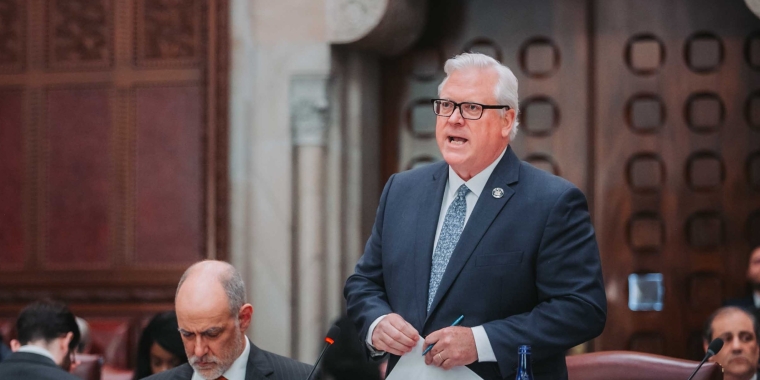
Senate Task Force on Heroin and Opioid Addiction holds forum in Yates County ~ O'Mara, colleagues developing recommendations focused on prevention, treatment and law enforcement

Senator O'Mara brought the Senate Task Force on Heroin to Penn Yan on Tuesday night to hear local testimony on the heroin epidemic.
Penn Yan, N.Y., February 24—State Senator Tom O’Mara (R,C,I-Big Flats) sponsored a meeting of the Joint Senate Task Force on Heroin and Opioid Addiction Tuesday night to hear from area law enforcement leaders, health professionals, educators, recovering addicts and family members on the regional heroin crisis.
The well-attended forum was held in the Penn Yan Middle School Auditorium at 515 Liberty Street. O’Mara, a member of the Senate task force, was joined in Penn Yan by the task force co-chairs, Senators George Amedore (R,C,I-Rotterdam), Terrence Murphy (R,C,I-Yorktown) and Robert Ortt (R-North Tonowanda), as well as task force member Senator Rich Funke (R,C,I-Perinton) and area State Assemblyman Phil Palmesano (R,C,I-Corning).
“It’s important to hear directly from those on the front lines locally who can help us target the necessary responses, and I’m grateful for last night's participation. Together with similar forums being conducted throughout New York State, the local input we're receiving will help our task force build on and strengthen the state-local partnership that's going to be critical to putting in place the most up to date and effective combination of law enforcement, awareness and education, and treatment and prevention," said O'Mara.
The lawmakers received testimony from regional law enforcement officers, first responders and district attorneys, drug addiction counselors and treatment providers, recovering addicts and family members, social services and health professionals, educators and other experts about the range of complex challenges posed by heroin including addiction prevention and treatment options, drug-related crimes, and other community and public health and safety impacts.
Read more on last night's forum HERE
[NOTE: A video replay of the entire Penn Yan forum will be posted on omara.nysenate.gov in the near future]
Those participating in last night's panel discussions were: Yates County Sheriff Ronald Spike; Schuyler County Sheriff William Yessman, Jr.; Investigator Thomas Dunham of the Village of Penn Yan Police Department; Yates County District Attorney Valerie Gardner; Schuyler County District Attorney Joseph Fazzary; Beaver Dams Fire Department Chief Kirk Smith; Yates County Court Judge W. Patrick Falvey; Penn Yan Village Justice Matthew Conlon; Annmarie Flanagan of the Yates County Substance Abuse Coalition; Danielle Tilden of the Finger Lakes Addictions Counseling & Referral Agency; Mike Ballard of the Council on Alcoholism and Addictions of the Finger Lakes; Yates County Public Health Director Deb Minor; Yates County Public Health Director of Community Services George Roets; Marcia Kasprzyk of the Schuyler County Health Department; Penn Yan Central School District Superintendent Howard Dennis; Dundee Central School District Superintendent Kelly Houck; Watkins Glen Central School District Superintendent Tom Phillips; and Alexis Pleus, founder of the national, non-profit advocacy organization Truth Pharm.
O’Mara said that several area recovering addicts and family members also shared their stories. [See attached list below of the scheduled panels]
"Regional communities have been particularly and admirably responsive in the fight against heroin. So many local law enforcement leaders, community leaders, health professionals, recovering addicts, families and other concerned citizens have been vocal and active” O’Mara said. “We need to keep working, at every level of government, to try to keep our laws, programs and services ahead of this heroin epidemic. We can’t let up for one second.”
The bipartisan Senate task force was created in 2014 at a time when local police departments and addiction centers, including many across the Southern Tier and Finger Lakes regions, were pointing to the alarming rise in the availability and use of heroin.
O’Mara sponsored a task force hearing at Elmira College in 2014. He said that since that time, while the work of the Senate task force has helped to enact important new state-level laws and other programs and services, the heroin crisis has grown increasingly urgent and continues to escalate across the Southern Tier and Finger Lakes regions, as well as throughout New York State and the nation.
According to figures from Cayuga Addiction Recovery Services, the numbers of 19-to-25 year olds in the Southern Tier and Finger Lakes treated for drug abuse increased more than 35 percent from 2007 to 2012. The National Institutes of Health (NIH) has estimated that approximately 23 percent of those who use heroin become dependent on the highly addictive drug.
In addition to the Penn Yan forum, the Senate task force has also scheduled additional hearings throughout the state.
O’Mara, who has been highlighting the proliferation of heroin, meth, bath salts and other illegal drugs across the Southern Tier and Finger Lakes over the past few years, said that he and his Senate colleagues will continue to develop legislative recommendations for combating, preventing and treating the drug’s spread.
Over the past two years, the work of the Senate panel has led to the enactment of numerous new laws which O’Mara has co-sponsored, including new laws to:
> require the state Office of Alcoholism and Substance Abuse Services (OASAS) and the state DOH to establish what’s now known as the “Combat Heroin” awareness and education program. The program utilizes social and mass media to reduce the stigma associated with drug addiction, while increasing public knowledge about the dangers of opioid and heroin abuse, the signs of addiction, and relevant programs and resources (combatheroin.ny.gov);
> establish school-based drug prevention programs to add age-appropriate information about the dangers of illegal drug use to junior high and high school health class curriculums;
> establish the Opioid Treatment and Hospital Diversion Demonstration Program, requiring the development of a new model of detoxification and transitional services for individuals seeking to recover from opioid addiction that reduces reliance on emergency room services;
> enable parents with a child suffering from substance use disorder to receive an assessment for the disorder through the Person in Need of Supervision (PINS) diversion process and thereby access a variety of counseling and treatment services;
> create a “Relapse Prevention Demonstration Program” to allow OASAS to provide referral services for individuals while they’re participating in a substance abuse treatment program, and for nine months afterwards. The community support referrals, aimed at preventing relapses, include educational resources, peer-to-peer support groups, social services and family services and counseling, employment support, transportation assistance, legal services, and child care services;
> promote the affordability of substance abuse services by requiring insurers to comply with federal substance abuse parity laws, strengthening and standardizing the utilization review process for determining insurance coverage for substance abuse treatment disorders, and requiring insurers to continue to provide and reimburse for treatment throughout the appeals process;
> authorize DOH Bureau of Narcotic Enforcement (BNE) investigators to directly access the criminal histories of individuals suspected of criminally diverting prescription medications;
> penalize obtaining a controlled substance by fraud or deceit; and
> make the sale of a controlled substance by a physician or pharmacist a Class C felony.



